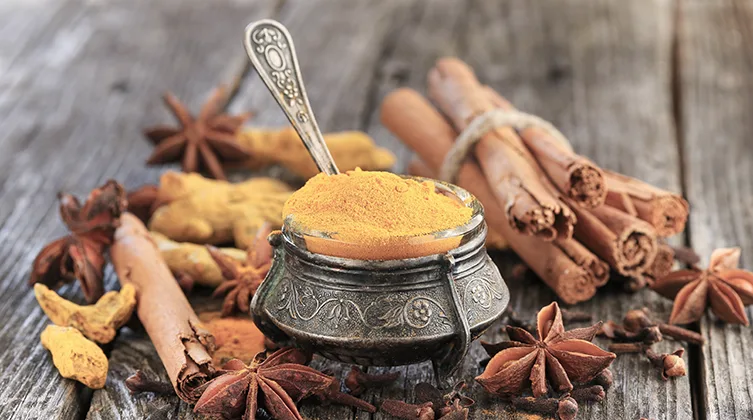Healing from depression requires a multifaceted approach and continuous nurturing, and re-nurturing. If you or someone you love is looking for complementary natural approaches, here are three science-backed additions to spice up your life!
1. TURMERIC
This attractive golden spice has topped the superfood charts in recent years, and rightfully so. The active component of turmeric, curcumin, is known for its anti-inflammatory properties and depression now recognised for it’s underlying chronic inflammatory conditioning. As for the science, a progressive paper was published in 2014 setting the scene for turmeric’s effectiveness in treating depression (1).
I recommend incorporating some fresh and vibrant vegetable-packed curries into your weekly meal plan. Here’s the recipe for my Green & Gold Chicken Curry, and you’ll find a few more in The Healthy Reset. You can also incorporate turmeric into teas, smoothies, omelettes, scrambled eggs or tofu, and more.
2. SAFFRON
Saffron (crocus sativus L.) is the most abundantly studied spice when it comes to mood and depression. Studies have shown great efficacy for its potent effects in alleviating mild to moderate depression. When contested against the antidepressant drug, Prozac, the spice worked equally well at reducing depressive symptoms and without the added side effects (2).
Unfortunately, the price tag of saffron is exuberant. Saffron is harvested from the crocus flower, especially the threadlike stigmas that radiate from the center. Nurturing these low-yield flowers takes patience and is not a particularly lucrative business.
The good news, smelling a small drop of diluted saffron compared to a placebo may improve symptoms of anxiety in women (3). Perhaps, we need to wake up and smell the saffron more specifically? Studies utilizing the petals of the plant in capsule form have also shown great efficacy (4).
3. CINNAMON
Cinnamon is a beautiful spice that has been well studied for its insulinotropic effects and diminishing cravings for refined sugar (5). Keeping your gut microbiota happy with a low-sugar diet is essential for a homeostatic gut-brain connection. Individuals riding the blood sugar roller coaster are also more likely to experience irritability and depressive symptoms.
In addition to having potent anti-diabetic effects, cinnamon is a powerful antioxidant, anti-inflammatory, antimicrobial and lipid-lowering compound (6). Add a sprinkle of cinnamon to your morning oatmeal or toast with peanut butter and banana, yum!
I hope you enjoyed this article! Managing the blues is really f-**en hard, I get it! It can also be an exciting journey when you begin to realize all the magical, natural options available. ♡
Boring (or for some exciting) science journal articles (because sometimes I put in extra time for references):
(1) https://www.ncbi.nlm.nih.gov/pubmed/23832433
(2) https://www.ncbi.nlm.nih.gov/pubmed/15707766
(3) https://www.ncbi.nlm.nih.gov/pubmed/21242071
(4) https://www.ncbi.nlm.nih.gov/pubmed/17174460
(5) https://www.ncbi.nlm.nih.gov/pubmed/28096957
(6) https://www.ncbi.nlm.nih.gov/pubmed/24817901





